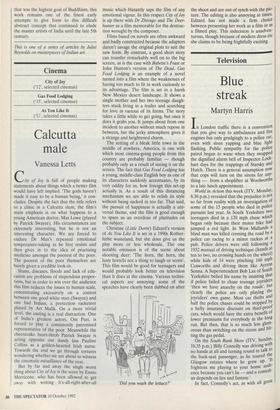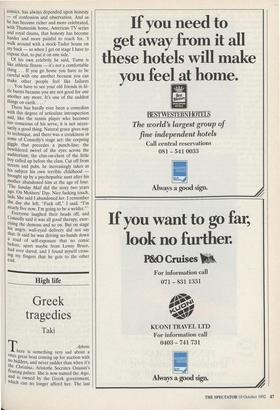Television
Blue streak
Martyn Harris
In London traffic there is a convention that you give way to ambulances and fire engines but only grudgingly to a police car, even with siren yapping and blue light flashing. Public sympathy for the police patrol began to wane when they swapped the dignified alarm bell of Inspector Lock- hart days for the trappings of Starsky and Hutch. There is a general assumption now that cops will turn on the sirens for any- thing — from a shoplifter at Woolworths to a late lunch appointment. World in Action this week (ITV, Monday, 8.30 p.m.) revealed that the prejudice is not so far from reality with an investigation of some of the 15 people who died in pollee pursuits last year. In South Yorkshire two teenagers died in a 120 mph chase which began only because their motor bike had jumped a red light. In West Midlands a blind man was killed crossing the road by a police car racing to a minor ruckus at a pub. Police drivers were still following a 1932 manual of driving technique (hands at ten to two, no crossing hands on the wheel) while kids of 14 were pinching 160 mph Cosworths and driving them like Ayrton Senna. A Superintendent Bob Lax of South Yorkshire belied his name by insisting that if police failed to chase teenage joyriders `then we have anarchy on the roads', but clearly the police are only playing the joyriders' own game. Most car thefts and half the police chases could be stopped by a hefty insurance discount on thief-proof cars, which would have the extra benefit of lower premiums for everybody in the long run. But then, that is so much less glam- orous than switching on the sirens and hit- ting the gas pedal. On the South Bank Show (ITV, Sunday, 10.35 p.m.) Billy Connolly was driving with no hands at all and turning round to talk to the back-seat passenger, as he toured the Glasgow estates where he grew up. It frightens me playing to your home audi- ence because you can't lie — and a comedi- an depends on lies and fantasy.'
In fact, Connolly's act, as with all great comics, has always depended upon honesty — of confession and observation. And as he has become richer and more celebrated, with Thameside home, American TV series and royal-chums, that honesty has become harder and more painful to reach for. 'I walk around with a mock-Tudor house on my back — so when I get on stage I have to expose that, to put it on one side.' Of his own celebrity he said, 'Fame is like athletic fitness — it's not a comfortable thing . . . If you go home you have to be careful with one another because you can make other people feel like failures • • . You have- to see your old friends in lit- tle bursts because you are not good for one another any more. It's one of the saddest things on earth. . . .
There has hardly ever been a comedian with this degree of articulate introspection and, like the tennis player who becomes too conscious of his serve, it is not neces- sarily a good thing. Natural grace gives way to technique, and there was a creakiness in some of Connolly's stage act: the corpsing giggle that precedes a punch-line; the bewildered swivel of the eyes across the auditorium; the chin-on-chest of the little boy called up before the class. Cut off from streets and pubs, he increasingly takes as his subject his own terrible childhood brought up by a psychopathic aunt after his mother abandoned him at the age of four. The Sunday Mail did the story two years ago. On Mothers' Day. Nice fucking touch, lads. She said I abandoned her. I remember the day she left. "Fuck off," I said. "I'm nearly five now. I'm going to be a welder."'
Everyone laughed their heads off, and_ Connolly said it was all good therapy, exor- cising the demons and so on. But on stage his angry, wall-eyed delivery did not say that. It said he was driving no-hands down a road of self-exposure that no comic before, apart maybe from Lenny Bruce, had ever dared, and I found myself cross- ing my fingers that he gets to the other end.



























































 Previous page
Previous page